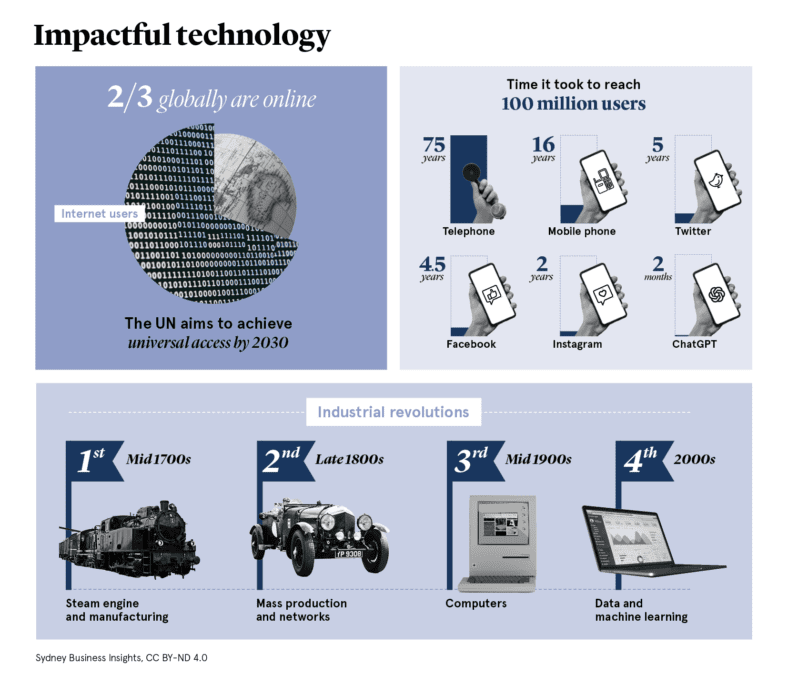电话用了75年的时间才达到1亿用户。手机用了16年,Twitter用了5年,Facebook用了4年半。Instagram花了2年时间,ChatGPT只用了2个月就获得了1亿用户。
在第四次工业革命中,举足轻重的科技正在改变我们的工作、思考和生活方式。这个大趋势的变革速度是惊人的。
在本世纪初,世界上仅有3%的人可以上网。目前约有三分之二的人上网,而2030年实现普遍上网是联合国可持续发展目标之一。
本世纪的发明清单十分可观:人工智能(AI)、先进机器人、无人机、智能设备、3D打印、云计算、区块链技术、虚拟和增强现实、应用程序APP和社交平台、商业空间技术,以及崭露头角的CRISPR和基因编辑。
生成式AI是下一个通用技术,与个人电脑、互联网和移动电话一样具有变革性。它将影响各行各业,那些能与生成式AI开展创造性互动的人将成为各自领域的领导者。
人工智能(AI)市场将在这十年中增长20倍,预计在2030年达到近2万亿美元。
举足轻重的科技也带来了重大的实操和伦理挑战:
大型科技公司控制着全球的信息流和通信基础设施,而它们应该如何被监管?
日益提升的产品和服务与我们的隐私权之间又该如何权衡取舍?
基因编辑有望成为治愈失明的一种手段,但我们能遏制住打造“完美”婴儿的欲望吗?
谁将会是自动化工作的赢家和输家?
政府、企业和领导人面临的挑战将是确保这些新兴科技既能发挥其潜力,又能具备可得性,且公平和对社会有益。
Kemp, S. (2023). Digital 2023: Global Overview Report, Data Reportal. Available at: https://datareportal.com/reports/digital-2023-global-overview-report
United Nations’ International Telecommunication Union (ITU) (2022). ‘New UN Targets Chart Path to Universal Meaningful Connectivity’. Available at: https://www.itu.int/hub/2022/04/new-un-targets-chart-path-to-universal-meaningful-connectivity/
Thormundsson, B. (2023). ‘Global Artificial Intelligence Market Size 2021-2030’, Statista. Available at: https://www.statista.com/statistics/1365145/artificial-intelligence-market-size/
Hu, K. (2023). ‘ChatGPT sets record for fastest-growing user base’, Reuters 3/2/23. Available at:
https://www.reuters.com/technology/chatgpt-sets-record-fastest-growing-user-base-analyst-note-2023-02-01/
Livemint (2023). ‘Chat GPT’s meteorical rise – 100 million users in 2 months’, Mint 5/3/23. Available at:
https://www.livemint.com/technology/tech-news/chatgpts-meteorical-rise-100-million-users-in-2-months-11677997670518.html

We believe in open and honest access to knowledge. We use a Creative Commons Attribution NoDerivatives licence for our articles and podcasts, so you can republish them for free, online or in print.





